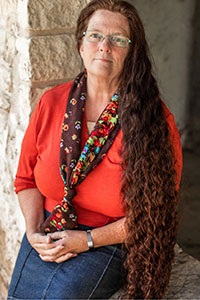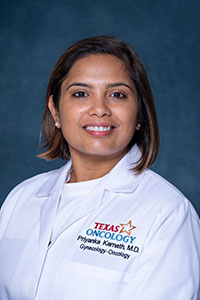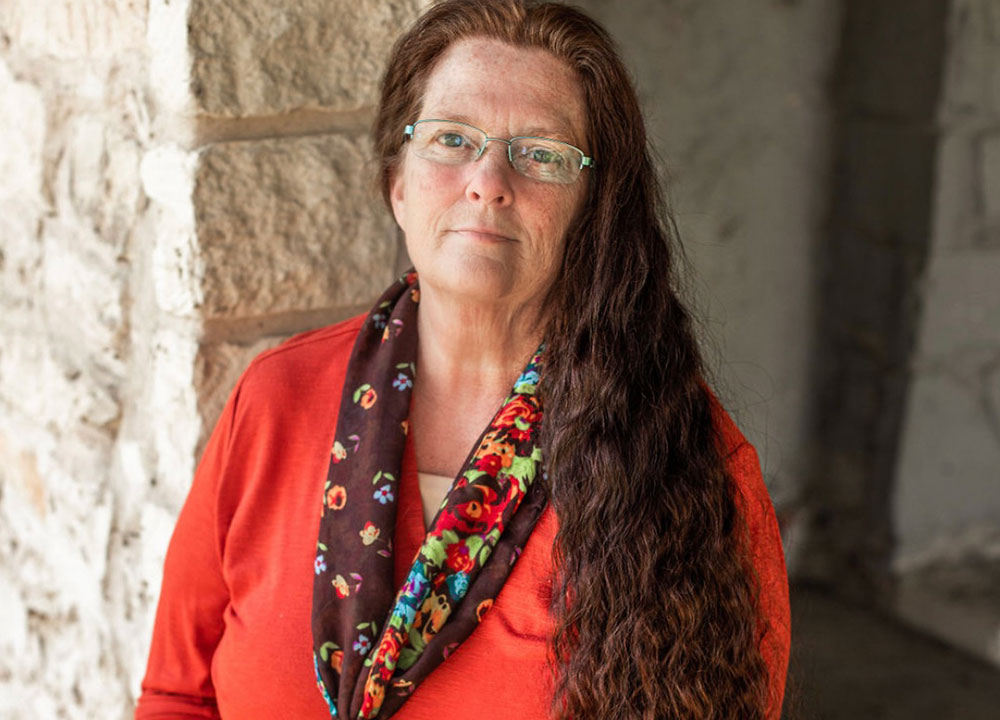A decked-out RV is where Katherine “Kat” Golden and her husband Jim call home in Elgin, Texas. A retired master carpenter, Jim outfitted the RV with custom cabinets and floors and attached his wood shop next door. “We have the best kitchen in an RV that anyone could ask for,” chuckled Kat, who works part-time with the City of Elgin.
At home, Jim gives Kat a back rub or makes breakfast to help her as she takes on her journey with cancer. And as she looks back on what led her to where she is today, she feels like she’s “privileged that things have worked out the way they have,” and wants others to recognize the importance of regular exams and screenings to protect their health.
Freezing a moment in time

outlook and leans on her support
system during her cancer journey.
In her 20s, Kat visited a gynecologist for her regular pap test and was surprised to receive abnormal results. She had already had three children and thought, “What does ‘abnormal’ mean? Is it cancer or something I shouldn’t worry about?”
At the time, her gynecologist conducted cryosurgery, a procedure to kill abnormal, pre-cancerous cells by freezing them. She went on to have several more pap tests, all of which returned clean results. She figured everything was fine – no one ever mentioned anything about cancer.
“I had no idea how important those results were and what they really meant for my health,” recalled Kat, now 58. “Had I known then what I know now, I would’ve followed up with my doctor to learn more.”
What Kat didn’t know was that her abnormal cells showed human papilloma virus (HPV), a precursor to cervical cancer. Later, life got busy, and she missed several annual well-woman appointments.
A return to Texas Oncology
In April 2021, Kat began experiencing intense menstrual cramps and spotting. She wouldn’t have thought much of it, but she’d gone through menopause two years earlier. Knowing this didn’t feel right, Kat visited her gynecologist, who performed a pap test and took a biopsy of her cervix.
In June, the biopsy results and further imaging revealed Kat had stage II cervical cancer. “I thought back to that time in my 20s. If someone would have explained this to me years ago, I would’ve stayed tight on my annual exams, check-ups, and pap tests,” said Kat.

Texas Oncology
Austin Central and South Austin
“Stage II cervical cancer means that the cancer is locally advanced – it has spread outside of the cervix, but it has not spread outside of the pelvis,” said Priyanka Kamath, M.D., M.S., Texas Oncology–Austin Central and South Austin.
After visiting one provider in downtown Austin to discuss treatment for her cancer, Kat didn’t walk away feeling like all her questions were answered, so she contacted Texas Oncology–South Austin for another opinion. Shortly after reaching out, Kat received a phone call from Dr. Kamath and scheduled an initial appointment in November.
“Dr. Kamath explained my condition and how she’d approach treatment, and she made me feel so comfortable,” said Kat. “She was patient and presented everything in a way I could understand.”
“Kat is undergoing treatment for curative intent with radiation and with concurrent chemotherapy, which sensitizes the tumor to the radiation,” added Dr. Kamath. “It’s time-intensive, but it’s generally well-tolerated. Kat has a positive energy, which I believe will serve her well to tackle this head on.”
Kat’s first day of treatment was December 6, 2021. Since then, she feels great, maintains a positive outlook on her cancer journey, and is leaning on her support system and oncology team.
Short-term cost, long-term gain
Since being diagnosed with cancer, Kat feels that her perspective has become more positive. “It’s a scary thing, but it’s helped me focus on what really matters: my faith and my family. God is with me every step of the way and my family has been brought closer together.”
She’s grateful, too, for the turn her life took at the start of the COVID-19 pandemic. “I couldn’t imagine working full time with all of the tests and bloodwork, let alone during treatment.”
In addition to her health, her focus remains on educating others about preventative measures they can take now.
“I want people to know that the small cost of getting a pap test or going for your annual exam is nothing compared to cancer treatment – it’ll cost you less stress, pain, and money in the long run,” said Kat. “‘Get it done’ is my message. Don’t wait for your screenings like mammograms or pap tests.”
“Kat is not only a strong woman, but also an incredible advocate for herself,” said Dr. Kamath. “I always tell patients that ‘knowledge is power,’ and from the first time I met Kat, she truly came prepared, listened to the information that was presented to her, and was not afraid to ask thoughtful questions. I believe that this type of dialogue helps patients feel empowered in a time when they may feel like they lack control, and helps the physician better understand patients’ goals and wishes.”
Kat knows more education is needed. She’d “shout from the rooftops” the things she wishes she would’ve known in her 20s, like the connection between HPV and cervical cancer and the importance of regular pap tests.
Although it wasn’t available to her, Kat stresses the importance of learning more about the HPV vaccine to protect yourself against the virus. She also encourages others to visit websites of organizations like Texas Oncology and the American Cancer Society to make sure they’re educated and understand all they can do to protect their health.
“Keep track of your health, and don’t let regular tests or check-ups slide,” said Kat. “Listen to your body and don’t wait.”
In Texas in 2021, more than 1,400 new cases of cervical cancer were expected. For more information about cervical cancer, visit TexasOncology.com.


